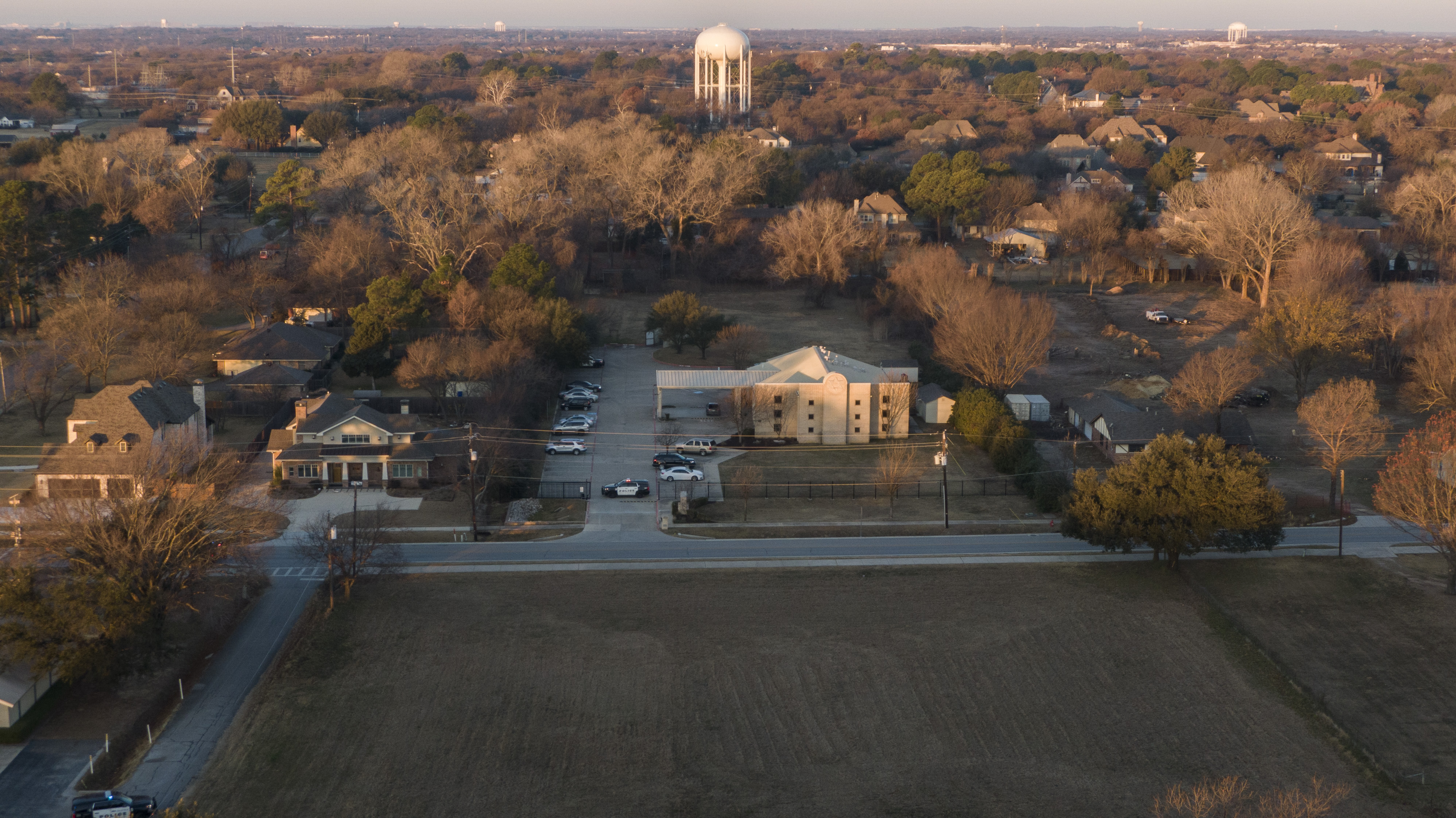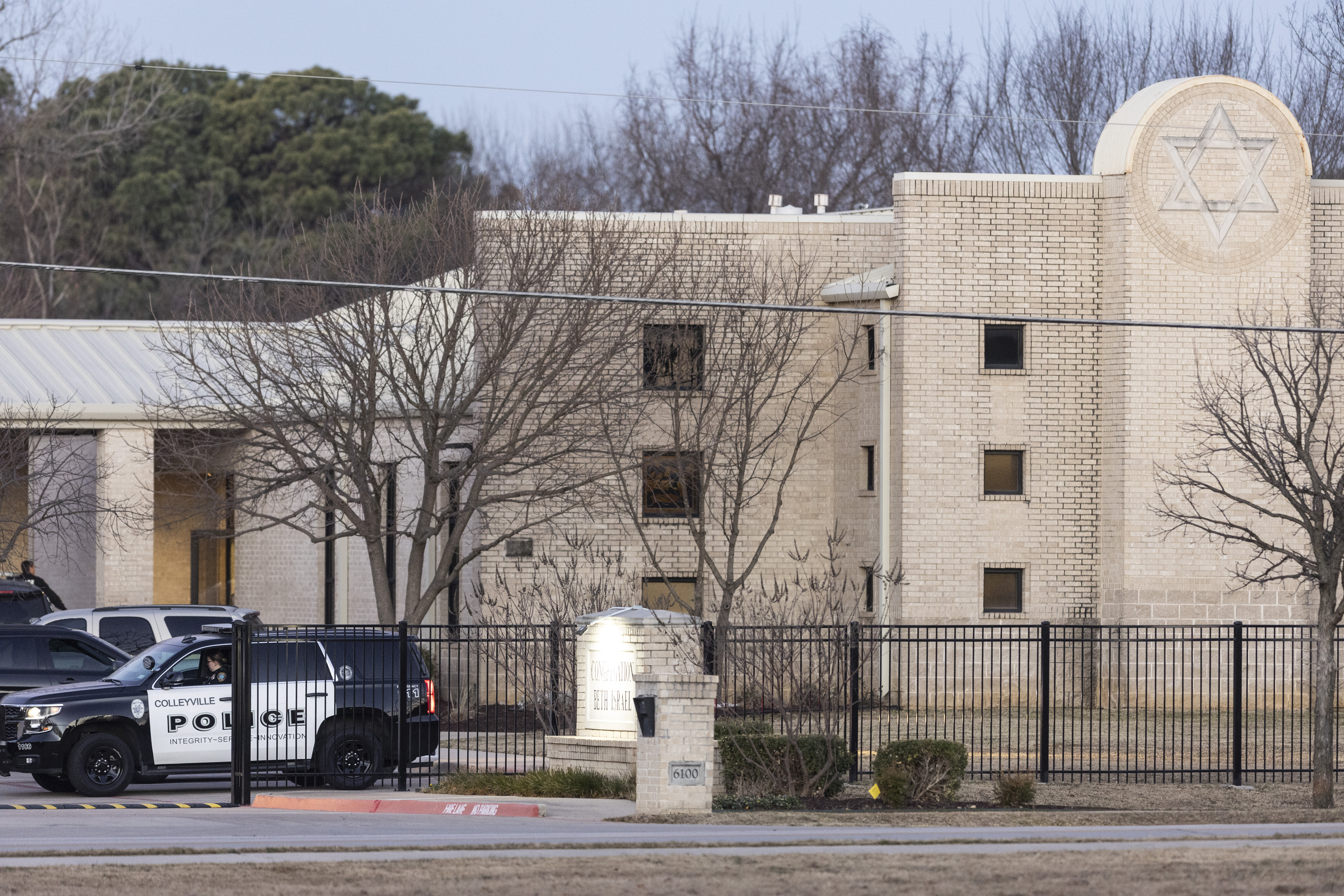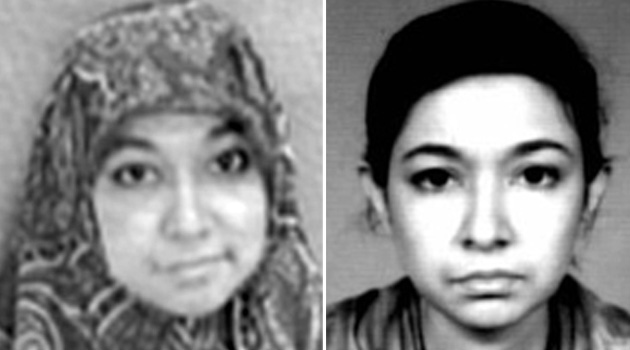What to Know
- Authorities identified the hostage-taker as a 44-year-old British national, Malik Faisal Akram, who was killed Saturday night after the last hostages ran out of Congregation Beth Israel around 9 p.m.
- The investigation stretched to England, where late Sunday police in Manchester announced that two teenagers were in custody in connection with the standoff.
- On Sunday night, the FBI issued a statement calling the ordeal “a terrorism-related matter, in which the Jewish community was targeted.”
The search for answers about what prompted a man to take hostages at a Colleyville temple now spans across the globe.
The FBI has identified the Congregation Beth Israel hostage-taker as 44-year-old Malik Faisal Akram, a British citizen.
British Police Question Teens
Get top local stories in DFW delivered to you every morning. >Sign up for NBC DFW's News Headlines newsletter.
Late Sunday, British counterterrorism police said they were questioning two teenagers in Manchester, England, in connection with the investigation.
A senior U.S. law enforcement official told NBC News the teens are Akram's sons, who were believed to have been in touch with their father during the standoff. There is no indication the sons are suspects in the case, and the FBI has said it appears Akram acted alone.
Akram's family released a statement to our partners at Sky News in the United Kingdom saying, "We are absolutely devastated as a family" and "…do not condone any of his actions…"
The statement went on to say Akram, "was suffering from mental health issues."
Search for Motive
In the hours before the FBI's elite hostage rescue team entered the Colleyville temple late Saturday, crisis negotiators spent hours communicating with Akram.
Law enforcement officials tell NBC 5 Akram was fixated on one thing: the release of Aafia Siddiqi, a Pakistani scientist who's been called "Lady Al Qaeda."
Siddiqui is currently being held at the federal prison medical center, FMC Carswell in Fort Worth, after her conviction for firing shots at US troops and federal agents who were questioning her in a counterterrorism investigation in Afghanistan in 2008.
Her conviction has sparked protests from groups who believe she was wrongly convicted, including a protest outside FMC Carswell last fall.
But in a news conference Sunday The DFW Council on American Islamic Relations (CAIR-DFW) which has campaigned for Siddiqui's release, and Siddiqui's attorney said the hostage-taker does not speak for Siddiqui's cause and that they have had no contact with the man.
"The perpetrator was not from here and certainly does not represent us or anything we stand for," said Faizan Syed of CAIR DFW-Austin. "I want to state clearly and equivocally that we do not know this individual in any way."
In the days before the synagogue attack, there was more chatter about Siddiqui's case on social media as supporters posted concerns about Siddiqui's mother who was recently hospitalized.
But federal law enforcement officials tell NBC 5 they are still looking into what motivated Akram and cannot say if he was inspired by any recent events.
They are also examining his travel history, tracing how and when he came to the DFW area, and to the standoff at the temple that ended his life. His hostages escaped unharmed.
Weapon Used
Authorities are also trying to determine where Akram obtained the weapon he brandished as he held a rabbi and three others hostage.
ATF agents were working Sunday night to trace the origins of that gun.
President Joe Biden called the episode an act of terror. Speaking to reporters in Philadelphia on Sunday, Biden said Akram allegedly purchased a weapon on the streets.
Federal investigators believe Akram purchased the handgun used in the hostage taking in a private sale, according to a person familiar with the matter who spoke on condition of anonymity because the investigation is ongoing. Akram arrived in the U.S. at John F. Kennedy International Airport in New York about two weeks ago, a law enforcement official said.
Akram arrived in the U.S. recently on a tourist visa from Great Britain, according to a U.S. official who spoke on condition of anonymity because the information was not intended to be public. London’s Metropolitan Police said in a statement that its counter-terrorism police were liaising with U.S. authorities about the incident.
Terrorism Investigation
On Sunday night, the FBI issued a statement calling the ordeal “a terrorism-related matter, in which the Jewish community was targeted.” The agency said the Joint Terrorism Task Force is investigating.
Michael Finfer, the president of the congregation, said in a statement “there was a one in a million chance that the gunman picked our congregation.”
Texas resident Victoria Francis, who said she watched about an hour of the livestream, said she heard the man rant against America and claim he had a bomb. Biden said there were apparently no explosives, despite the threats.
“He was just all over the map. He was pretty irritated and the more irritated he got, he’d make more threats, like ‘I’m the guy with the bomb. If you make a mistake, this is all on you.’ And he’d laugh at that,” Francis said. “He was clearly in extreme distress.”
Andrew Marc Paley, a Dallas rabbi who was called to the scene to help families and hostages upon their release, said Cytron-Walker acted as a calm and comforting presence. The first hostage was released shortly after 5 p.m. That was around the time food was delivered to those inside the synagogue, but Paley said he did not know if it was part of the negotiations.
Security Training Paid Off: Rabbi
Rabbi Charlie Cytron-Walker said security training over the years is what allowed him and the other three hostages to make it through the 10-hour ordeal, which he described as traumatic.
“In the last hour of our hostage crisis, the gunman became increasingly belligerent and threatening,” Cytron-Walker said in a statement. “Without the instruction we received, we would not have been prepared to act and flee when the situation presented itself.”
Cytron-Walker declined to speak at length about the episode. “It’s a little overwhelming as you can imagine. It was not fun yesterday,” he told the AP over the weekend.
Cytron-Walker said his congregation had received training from local authorities and the Secure Community Network, which was founded in 2004 by a coalition of Jewish organizations and describes itself as “the official safety and security organization” of the Jewish community in North America. Michael Masters, the CEO of the organization, said the congregation had provided security training in August and had not been previously aware of Akram.
The standoff led authorities to tighten security in other places, including New York City, where police said that they increased their presence “at key Jewish institutions” out of an abundance of caution.




